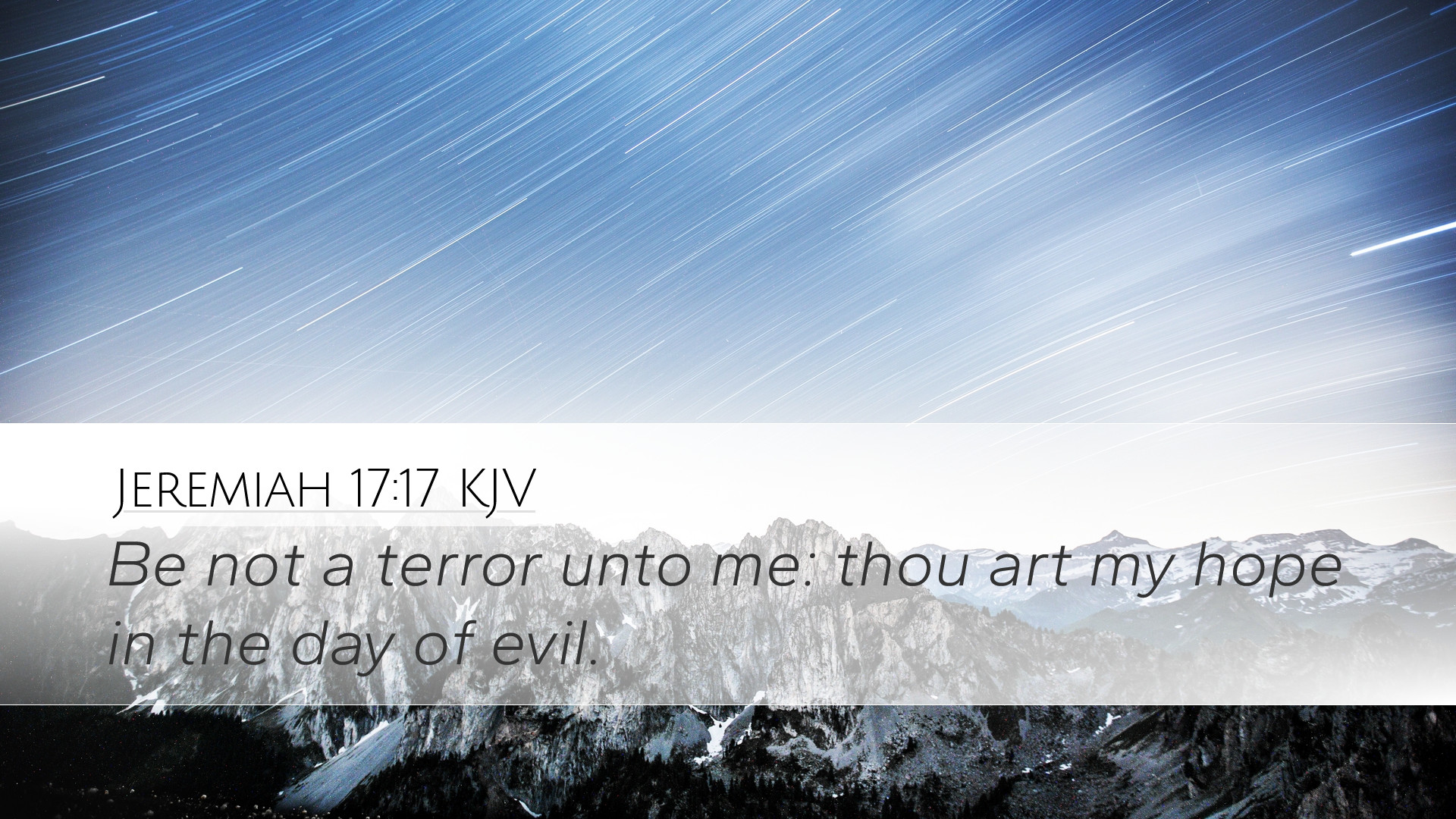Commentary on Jeremiah 17:17
Verse: "Be not a terror unto me: thou art my hope in the day of evil."
Introduction
The verse Jeremiah 17:17 stands as a poignant expression of the human struggle between fear and faith. In this context, the prophet Jeremiah is calling out to God, who is both a source of hope and a potential source of terror depending on the circumstances. Understanding this duality requires us to explore both the historical context and the theological implications embedded in this verse.
Contextual Background
The Book of Jeremiah is a profound narrative that engages with themes of judgment, lamentation, and hope. During a time of impending disaster for the nation of Judah, Jeremiah's prophecies often struck a note of despair. His role as a prophet included conveying God's messages of warning and encouragement to a people who had strayed far from their covenant with Him.
In examining this verse, one must consider the socio-political circumstances of Jeremiah's time—Judah faced devastation due to their disobedience and idolatry. Thus, his plea to God not to be a terror to him resonates with a deep longing for assurance amidst chaos.
Exegesis and Insights
1. The Nature of Fear: Matthew Henry notes that fear can come from external circumstances or the internal awareness of one's own shortcomings and sin. Jeremiah's plea reveals that he is acutely aware of the stakes—his hope hinges on God’s mercy rather than His judgment.
2. God as a Source of Hope: Albert Barnes emphasizes the paradox where, despite the circumstances, the prophet acknowledges God as the ultimate source of hope. In moments of deep struggle, where the world appears to be crumbling, the conviction that God remains a refuge is paramount. The term "hope" here suggests an enduring belief in God's faithfulness and deliverance even in the face of disaster.
3. The Day of Evil: Adam Clarke explores the "day of evil" metaphorically, representing times of trial and suffering. This phrase can be especially resonant for believers who endure their own days of evil—locating their solace and strength through trust in God. Clarke asserts that the acknowledgment of such evil encourages deeper faith as believers identify and confront their circumstances.
4. Relationship with God: The intimate relationship between the believer and God is highlighted in this verse. The plea not to be a terror signifies an understanding of God’s holiness paired with His grace. The interplay of reverence and intimacy showcases that while God is just and can instill fear, He is equally the source of comfort and assurance.
Theological Implications
The theological discourse surrounding this verse reveals significant insights into the nature of faith and the human-divine relationship.
- Faith in Adversity: This verse exemplifies the foundational belief that God can be trusted even when situations seem dire. This resonates with the New Testament truth that God’s presence brings peace in turmoil.
- The Role of Prayer: Jeremiah's direct communication with God reflects an essential aspect of spirituality—bringing our fears and hopes before the Lord in prayer, cultivating a deeper understanding of God’s character and promises.
- Understanding Divine Judgment: The concept of God as a 'terror' can be understood as the deserved consequences of sin. It serves as a reminder that God’s righteousness demands accountability yet allows room for mercy and redemption.
Application for Today
This verse has profound implications for modern readers, particularly pastors and theologians who look to Scripture for both guidance and assurance.
- Encouragement in Trials: In times of confusion and distress, believers are encouraged to remember that God is their ultimate hope. Pastors can draw from this verse in counseling sessions, emphasizing God’s unwavering presence in times of trouble.
- Instilling Faith: By framing God as both a source of hope and a righteous judge, believers can cultivate a balanced understanding of God's nature today; reviving not just fear, but deep reverence and love.
- Promoting Honest Prayer: Encouraging congregants to express their fears in prayer mirrors Jeremiah’s example, fostering a church culture of honesty and trust in God's plans, even when understood imperfectly.
Conclusion
Jeremiah 17:17 encapsulates a profound sentiment that resonates with both the biblical narrative and the human experience. It instills hope amid chaos through the acknowledgment of God’s character—a dual nature ready to embrace those who earnestly seek Him. For pastors, students, and theologians, this verse serves not only as an encouragement during difficult times but also as a strong reminder of the complex nature of the relationship with God—a relationship rooted deeply in faith, vulnerability, and hope.


